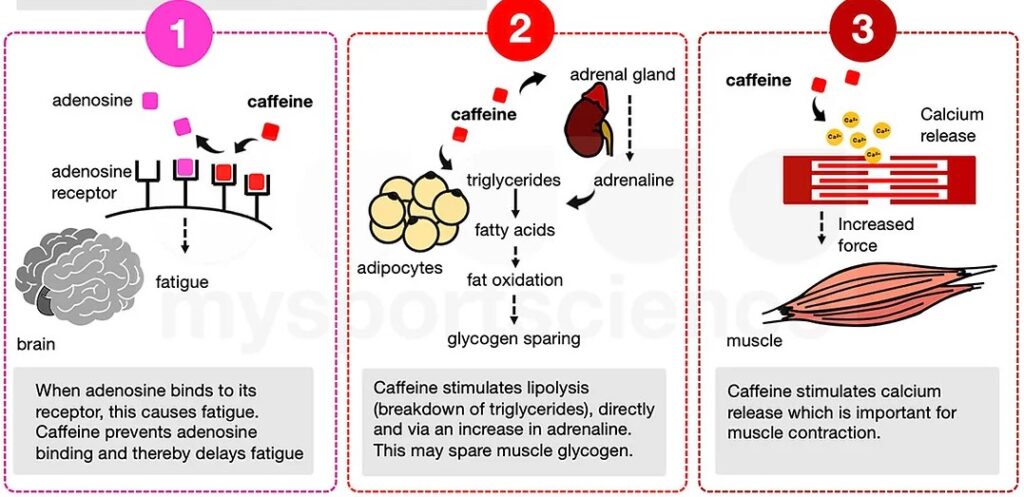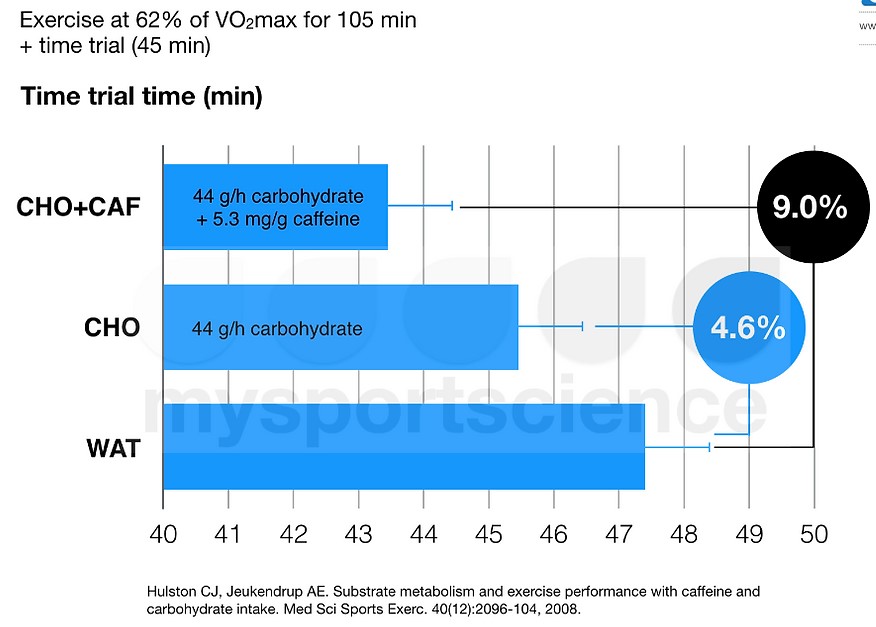Caffeine
Interesting Facts
- Consuming caffeine can lead to decreases in tiredness and even pain. While also boosting alertness and reaction time.
- On average caffeine consumption leads to a 4% increase in endurance performance.
- It is unlikely caffeine leads to an increase in fat oxidation (it doesn’t spare carbohydrates).
- Three key ways caffeine can help performance:

Sources:
- My Sport Science – The website of Asker Juekendrup, the Head Nutritionist for Jumbo Visma
- Tim Podlogar – Nutritionist for Bora Hansgrohe
- Various studies.

This study showed athletes perform better when they consume carbohydrates and caffeine at the same time.
How the Pro's Use Caffeine
We asked Tim Podlogar about how pro cyclists use caffeine in and around training.
“You have to be really careful with caffeine in training because it can negatively influence recovery. However, you should look to maintain normal intake. So if you’re used to drinking coffee in the mornings then go for it. But in general, I get my riders to save the caffeine for races and high work, hard training sessions”.
A clip from our interview with Tim
Coffee drinking is obviously one of the most popular traditions in endurance sports.
At this time, scientists are fairly certain the type of caffeine you consume doesn’t matter. I.e. if you consume it in a coffee or a gel there is no difference.
Below is another great image from My Sport Science showing the average caffeine content in different beverages. Note: each beverage had a very large variation between servings tested.


Why not try a membership?
- Up to 30% off SiS nutrition products.
- 20% off Em’s Power Bars
- 20% off OSM Bites
- 12% off Winning Energy Drink Mix
- Different free products added to your orders each month
- Free delivery
- Free personalised fueling strategies.
Blocking Adenosine
This is the primary benefit of consuming caffeine. The effect it has on the brain.
Adenosine is a molecule responsible for giving your body feelings of tiredness when you need to rest, and pain when your body is under stress.
As mentioned above, caffeine essentially blocks adenosine from binding to its receptor therefore decreasing sensations of tiredness and even pain.
Boosting Muscle Contraction
Large doses of caffeine have been shown to boost muscle contraction and therefore muscle force in multiple animal studies. However, the same findings have not been tested in humans. At the moment it is therefore just pure theory that caffeine boosts muscle contraction.
Sparing Carbohydrate Stores
This study shows a large increase in fat oxidation when subjects consumed 3mg/kg of caffeine.
However, after looking into the conditions of the study, examining other studies, and looking at other possibilities, most sports scientists doubt this to be true. As mentioned in multiple articles on the My Sport Science website.
How Much and How?
Some people find consuming caffeine during exercise can cause stomach upset. However, consuming caffeine during exercise before a crucial part of the race can be very helpful.
It takes between 40 and 60 minutes for caffeine to hit peak effect. After an hour it will slowly start to fade away and adenosine will take its place once again.
Therefore pro’s are often seen consuming caffeine 40 minutes before the hardest part of a race. Including Mathieu Van der Poel in the Tour of Flanders final 70km.
So how much?
This can vary between individuals. However, larger amounts are obviously going to have more of an effect. One key study showed the difference between 100mg consumed, 200mg consumed, and a placebo. 100mg was better than the placebo and 200mg was better than 100mg.
General daily recommendations are below 400mg. 1200mg can be very dangerous, potentially even causing seizures in some people. Therefore we recommend never consuming more than 500mg per day.
4-Hour Race Caffeine Consumption Plan
1 hour before race: 1 coffee – 150mg
Final 2 hours: Caffeine Gel – 75mg
45 minutes before a key hard section: Caffeine Gel – 150mg
Total: 375mg
Tolerance and Training
The more caffeine you consume, the less reactive you become to it. This means if you have it all the time, on race day you won’t get as much of a boost. But… as you know, you need to practice how you race, in training.
Therefore, we recommend consuming caffeine before and/or during training that is high in physical demand. For example, a 5 hour bike ride, or a 2 hour hard run.
Then 10 days out from a target race you want to cut out caffeine completely. This will boost the caffeine effect on your body leading to a greater performance increase on race day.
Proven Down-sides
Mathew Walker is known as the world’s number 1 sleep expert. One of his key rules to having a better nights sleep is… No caffeine after midday.
Mathew said he completely avoids caffeine. This is because it stays in your system for hours after consumption (up to 12 hours). What people don’t realise is this has an impact on the quality of your sleep rather than the time you spend asleep.
Night time coffee drinkers have significantly less deep sleep than non-caffeine drinkers. Therefore their sleep quality is lower.
Sleep is when adaptations happen. Without adaptations, you do not get any faster. Learn more about sleep here.